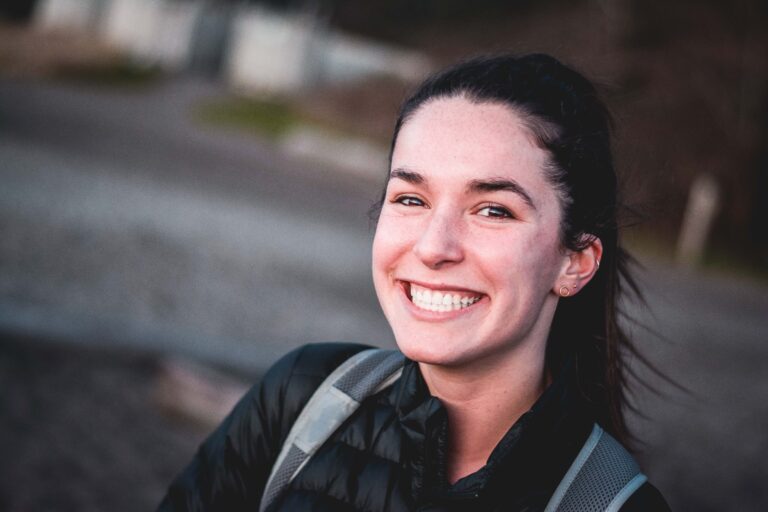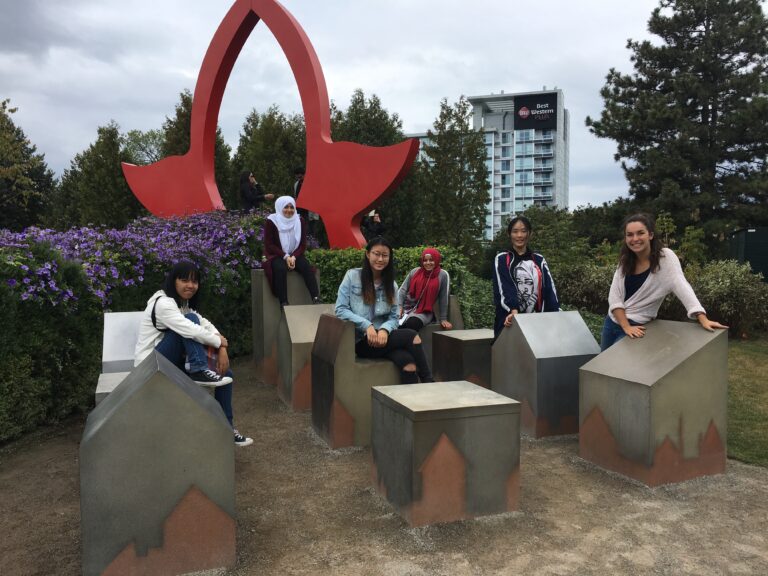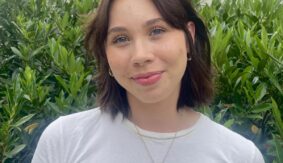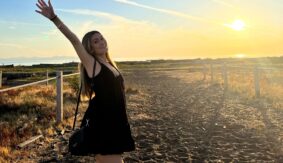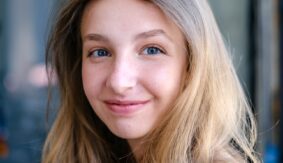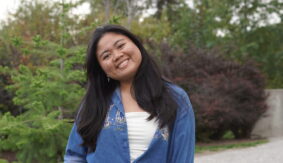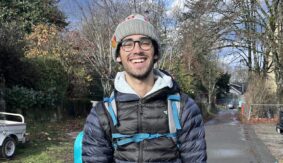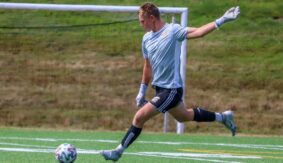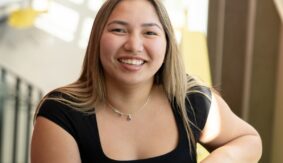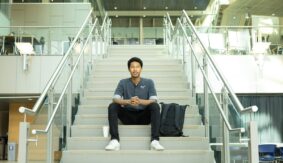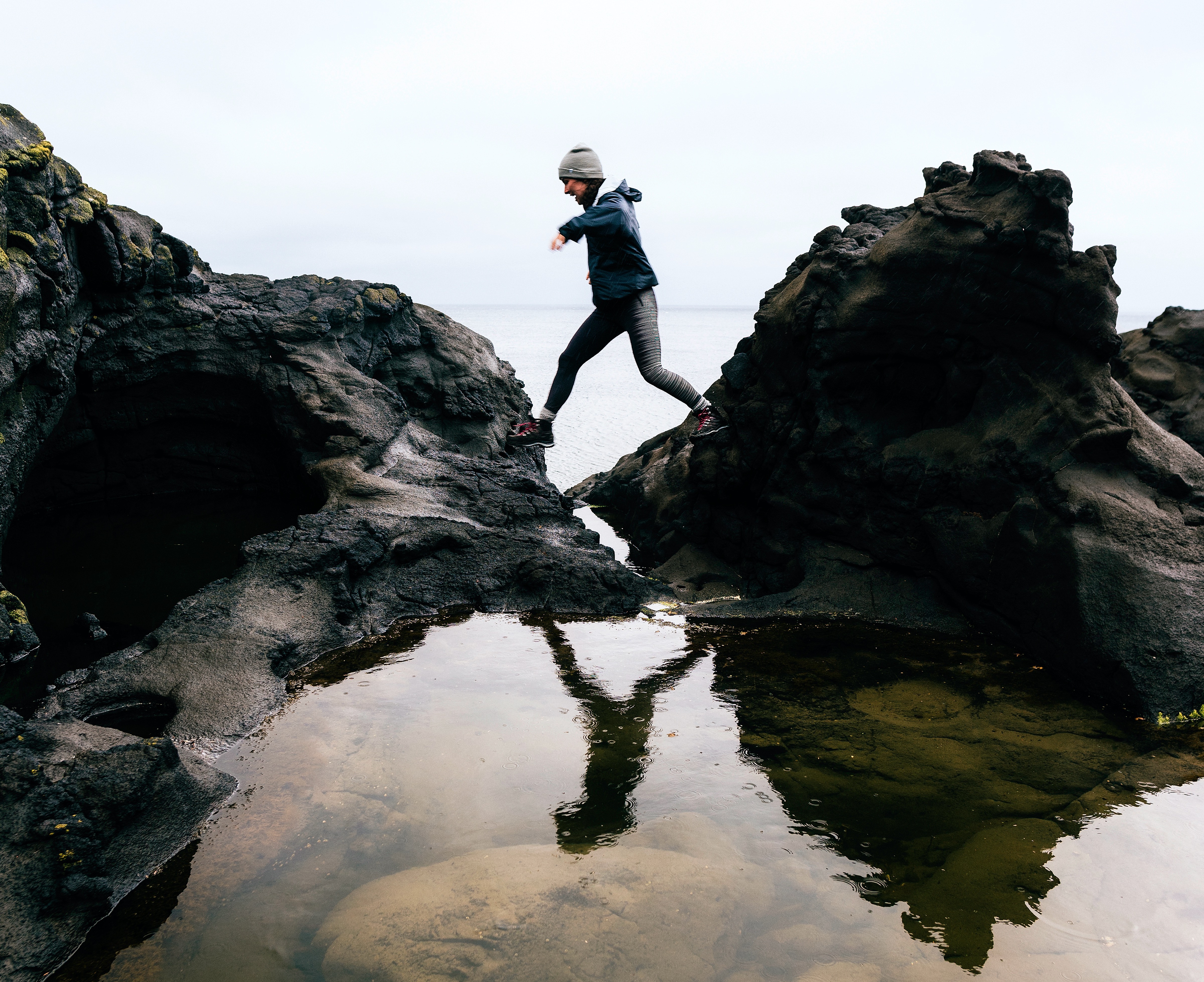
As Nina knows well, Forestry at UBC is about much more than lumberjacks.
During high school in Ottawa, Nina always enjoyed spending time in nature. Excited by encouraging others to get outside, she set up her own program at her school named Women for the Environment and the Great Outdoors. Nina chose UBC Forestry for her next step, and she is now continuing to explore the relationships between people and forests, as well as the plants, animals, air, and water in forested areas. During her time at UBC she’s conducted research on Douglas-fir and Western larch seedlings, climbed her first mountain, taken her first dip in the Pacific Ocean, and will graduate ready for an outdoor career of her choice.
What was your journey to UBC?
I have loved nature and being outside since I was little. My first trip to BC was when my Grade 7 band made Nationals. I can still vividly remember Stanley Park and being overwhelmed by the size of the trees. When I returned in Grade 11 for a campus tour, I knew instantly UBC was the only university I wanted to attend. From the mountains to the ocean and the location of the campus – you can’t go wrong. I feel extremely fortunate that the university I immediately fell in love with is where I get to study every day. It’s been an amazing experience in a wonderful community.
What attracted you to the Forestry program?
I love everything about forests – from the intertwined relationships of flora, fauna, air, and water, to the variety of renewable products we can derive from a sustainably managed forest. Forests are critical to our everyday lives, so I wanted to be part of a program that seeks to balance the different services that forests can provide, and inspires a new way to manage forests moving forward. Unfortunately, people sometimes have misperceptions about Forestry and think it is just about harvesting trees, but this is simply not the case. My Forest Resources Management major is about managing forests for timber as a renewable resource, but it’s also about managing forests for water quality, species diversity, climate resiliency, sustainable communities, and so much more. Of course, harvesting trees is – and should be – a part of the equation, but so is replanting and regenerating forests in a sustainable way.
What’s the best part about Forestry?
I love that I get to learn about critical issues that affect everyday life. I am beginning to better understand how climate change is affecting our planet, how it can negatively affect our forests’ health, and how we can manage our forests to keep them healthy, thriving, and profitable. I love the program because I study and learn about forests, I get to work in forests, and all of this feels so important and gives me peace of mind. Forests are often at the heart of the outdoor experiences that I love so much.
Photo: Ben Scheufler
Can you tell us about a memorable experience you’ve had as part of your degree?
You get to experience more than a degree at UBC – that’s my favourite thing. You have the opportunity to never, ever be bored. Within our Faculty, we have a Forestry undergraduate society that runs different events. They include everything from painting pots to trivia nights to organized intramural sports teams to our annual year-end event known as Coconut, where profs and students come together for a huge barbeque and listen to live music. In my first year at UBC, I hiked my first mountain, did my first polar dip in the Pacific Ocean, made numerous close friends who I now live with, got to grow my passion and knowledge of forestry, and much more.
What do you think is unique about learning in the Forestry Faculty?
The Faculty offers so much support and many opportunities for students to participate. Another truly unique highlight is our building. Let me tell you – we have, hands-down, the nicest studying space you will find on campus. Plus, it’s dog friendly, so profs often have their dogs in their office spaces, which is a lovely bonus. We also have one of the highest admin-to-student ratios on campus, meaning that many people are waiting to help and guide you. I know first-hand as a PASS leader and undergraduate teaching assistant that there are so many free resources students can use to excel in their courses and enjoy them. It truly is a community in the Faculty of Forestry.
Can you talk about a particular cause or social issue that you’re passionate about which your degree is helping you to address?
In my last year of high school, I started a program called WEGO – Women for the Environment and the Great Outdoors – with the help of my teacher Mrs Moons. WEGO was an all-girls outdoor-oriented club that focused on first- and second-generation Canadians from diverse backgrounds. These activities cost money, and not everyone has the funds to do these things, so I was thrilled when Nature Canada awarded me a Young Leaders Grant that covered the cost of the programming and activities that I organized.
I continue to be very passionate about the representation of women in Forestry and ensuring that there are many women in leadership positions in the forest sector in the future. If you look at the executive team of any large-licensee here in British Columbia, most will be white men. I don’t get discouraged by this but know that there truly needs to be more women and diversity in the forest sector in order to strengthen this important part of the Canadian economy. I’m passionate about forests and passionate about young women having as many options and opportunities as young men, and see this male-dominated industry as an opportunity to prove that I and others can do what men can do.
You’re also passionate about protecting our oceans, and have been involved with the Ocean Bridge project. Can you describe what you did?
Ocean Bridge brought together 40 Canadians aged 18 to 30 from across the country to participate in an immersive wilderness experience on Haida Gwaii, and an Ocean Literacy Urban Service Expedition which took place in Vancouver. As part of the program, we got to run local service projects in our communities, and so my WEGO events and various shoreline clean-ups along the Ottawa river counted towards my service projects. Ocean Bridge was truly a once-in-a-lifetime experience that taught me numerous lessons, and I got to meet many people I will never forget.
Two participants and friends, Micah Messent and Danielle Moore, passed away when their flight crashed in Ethiopia when they were on their way to the United Nations Environment Assembly. Whenever I think of Ocean Bridge, they are the first to mind, and I am thankful to have gotten to know them and feel firsthand their passions for our oceans and life itself. There is now a foundation in Danielle’s name and multiple awards in Micah’s for Indigenous students in BC.
As part of your degree, you’ve been able to conduct your own research. What was that experience like?
Working as a research assistant this past summer was so cool. I applied much of what I’ve been learning in my degree to real-life research and action. I was helping two PhD students, Beth Roskilly and Rafael Ribeiro, on experiments using Douglas-fir and Western larch seedlings from various populations across their range. We were examining and collecting data on the drought tolerance and cold hardiness of these species into the fall. The research will hopefully help determine which populations will survive in the future as our climate continues to change. I was incredibly lucky to work with such amazing people and with the Faculty’s associate dean of research, Dr Sally Aitken. Through my time and research with this team, I recently received the Canadian Forest Service Workforce Diversity Undergraduate Supplement award. I was the only undergrad researcher on campus to receive this, and not only did it feel great, but it also shows how relevant the work and research we do in Forestry can be.
What do you hope your Forestry degree will allow you to do in the future?
I want to use my degree to get experience working in the forest sector, most likely as a biologist technician for a couple of years before coming back to school to get a Masters. Luckily, my program and elective choices set me up to get both my registered professional forester and registered professional biologist designations upon graduation. Forestry is excellent as you can apply it to so many jobs. From an environmental lawyer, a professional researcher, teacher, an operator, or a CEO – the world is your oyster! I want to use my undergraduate experience to help put myself on a path that I will feel passionate about.
What would you say to prospective students who are considering applying to a Forestry degree?
I would say do it! It is a fantastic Faculty and degree that sets you up for various professional designations depending on your program upon graduation, such as a registered professional forester, a registered professional biologist, or a professional engineer. Whatever your passions are, I’m sure you can apply it to a degree in Forestry. Take the chance – you won’t regret it!
